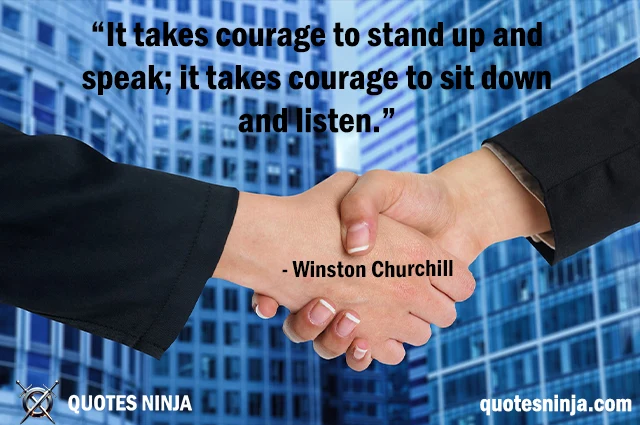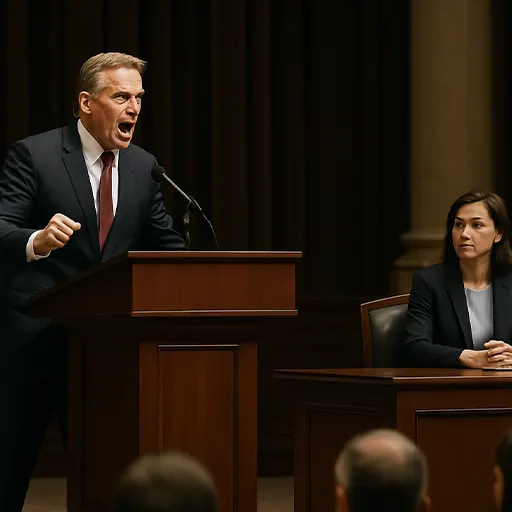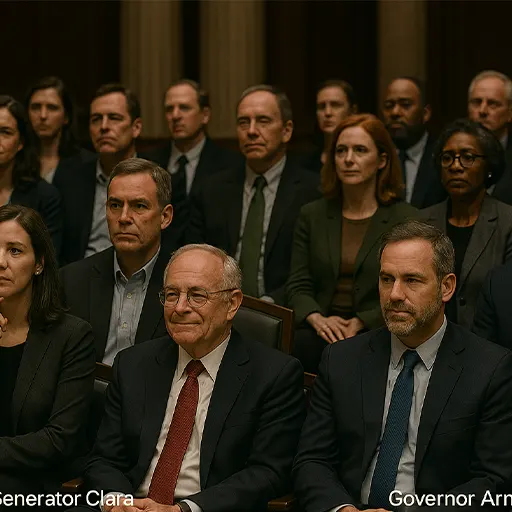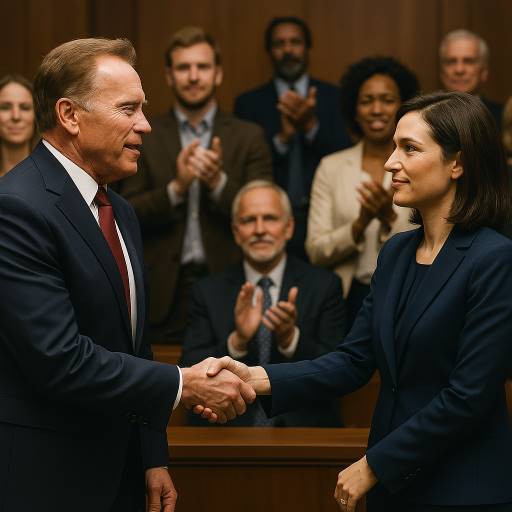
Courage Quote: “It takes courage to stand up and speak; it takes courage to sit down and listen.” is widely attributed to Winston Churchill, was a British statesman, military officer, and writer who was Prime Minister of the United Kingdom from 1940 to 1945 and again from 1951 to 1955.
Deeper Meaning of Courage Quote
The quote, “It takes courage to stand up and speak; it takes courage to sit down and listen,” speaks to the bravery required in both active participation and active listening.
- Courage to speak up:
Speaking out, especially when sharing an opinion or standing up for something important, requires bravery. It takes courage to express yourself, especially in situations where your thoughts or beliefs might be different from others, or when there’s a risk of criticism or rejection. This is especially true in situations where speaking up could be uncomfortable, challenging, or where you might fear judgment. - Courage to listen:
On the other hand, listening actively and without judgment also requires courage. When we listen, we expose ourselves to new perspectives, opinions, and sometimes challenging ideas. It can be difficult to listen openly, especially if what is being said contrasts with our own views or makes us feel uncomfortable. It also requires humility to sit back, process what others are saying, and be willing to learn or reconsider our own beliefs.
In essence, the quote suggests that courage is needed for both speaking out and listening deeply. While one is often viewed as an active, outward expression (speaking), the other—listening—is a more passive, yet equally vital, action that fosters understanding, empathy, and meaningful dialogue. Both are essential for effective communication and relationships.
Here’s a story inspired by Courage Quote “It takes courage to stand up and speak; it takes courage to sit down and listen.”
Courage Story: “The Politics of Listening“
In a small, divided country, two powerful political parties, The Right Wing Alliance and The Left Progressive Coalition, clashed over every issue. The air was thick with tension, and the citizens, caught in the middle, were struggling to make sense of it all. The right wing stood firm on tradition, advocating for strong borders and a return to “simpler times.” The left, on the other hand, rallied for progressive change, social justice, and environmental reforms.
One day, a pivotal moment arrived: a national debate on climate change was scheduled, and the country’s future seemed to hang in the balance. The leaders of both parties were ready to face off, but this time, something felt different. Both sides had grown so accustomed to shouting their beliefs over one another, rarely pausing to listen. Yet, each party had reached a point where they couldn’t ignore the growing frustration of their people.

Governor Arnold Speaking:
The Right Wing leader, Governor Arnold, stood at the podium with confidence, ready to voice the party’s stance on climate change. He spoke passionately, citing the economic risks of over-regulating industries and the potential harm to the livelihoods of ordinary citizens. “We cannot sacrifice jobs and our way of life for unrealistic green policies!” he exclaimed, his voice strong and unwavering. It took immense courage for Arnold to stand there, knowing that his words would be scrutinized and critiqued. He felt the weight of the moment. His side had always been criticized for being out of touch with environmental concerns, and yet, he knew they had to defend their position.
Across the room, Senator Clara, the leader of the Left Progressive Coalition, sat calmly, poised, and ready to respond. As Arnold spoke, she didn’t immediately prepare a counterattack. Instead, she took a deep breath and listened carefully. It was tempting to jump in, to correct every point he made, but Clara knew that if she wanted to foster real dialogue, she needed to understand his perspective first. She wasn’t just preparing a rebuttal; she was absorbing what was being said. It took courage to resist the urge to speak, to let Arnold voice his thoughts without interruption, especially when she deeply disagreed with him.

The Moment of Dialogue Shift:
When the time came for Clara to respond, she stood up slowly, facing both her supporters and the opposition. “I hear your concerns about jobs and economic stability,” she began, her voice steady and respectful. “But we cannot ignore the scientific consensus that climate change is a real and immediate threat. We must find solutions that benefit both the planet and its people. Yes, change will be difficult, but it is necessary.” Clara’s ability to listen first allowed her to craft a response that acknowledged Arnold’s fears while still pushing for the action she believed was needed. The room fell silent, the tension palpable.

The Crowd’s Reaction:
What happened next was surprising. Instead of the usual shouting match, the debate shifted. The crowd began to understand that both sides had valid points, and the leaders showed a willingness to engage thoughtfully. Arnold acknowledged the need for some form of environmental regulation, though he remained cautious about the extent. Clara, for her part, recognized the importance of preserving jobs but argued for transitioning to green industries that could create new opportunities.

The Moment of Mutual Understanding:
This shift in tone marked the beginning of a new kind of conversation. It wasn’t that they agreed on everything, but both sides now understood that speaking and listening required courage. Arnold had the courage to stand up and challenge the status quo, knowing his words would be contested. Clara had the courage to sit back and listen, even when every fibre of her being urged her to speak first.
From that day forward, their debates became less about winning and more about understanding. The country, too, began to change. Citizens, once polarized, started to engage in more open dialogues. They realized that true progress could only come when both sides, right and left, dared to speak their truth and listen to the other with an open heart.
And so, the quote echoed in the minds of many: “It takes courage to stand up and speak; it takes courage to sit down and listen.”
Here is the ending of Courage story from the quote “It takes courage to stand up and speak; it takes courage to sit down and listen.”
To explore more on stories and dive into related ideas, be sure to check out the other posts where we cover all sort of stories related to quotes. Stay tuned for more…..
To explore more on quote topics, be sure to check out the other topics where we cover all categories of quotes. Stay tuned for more…..

